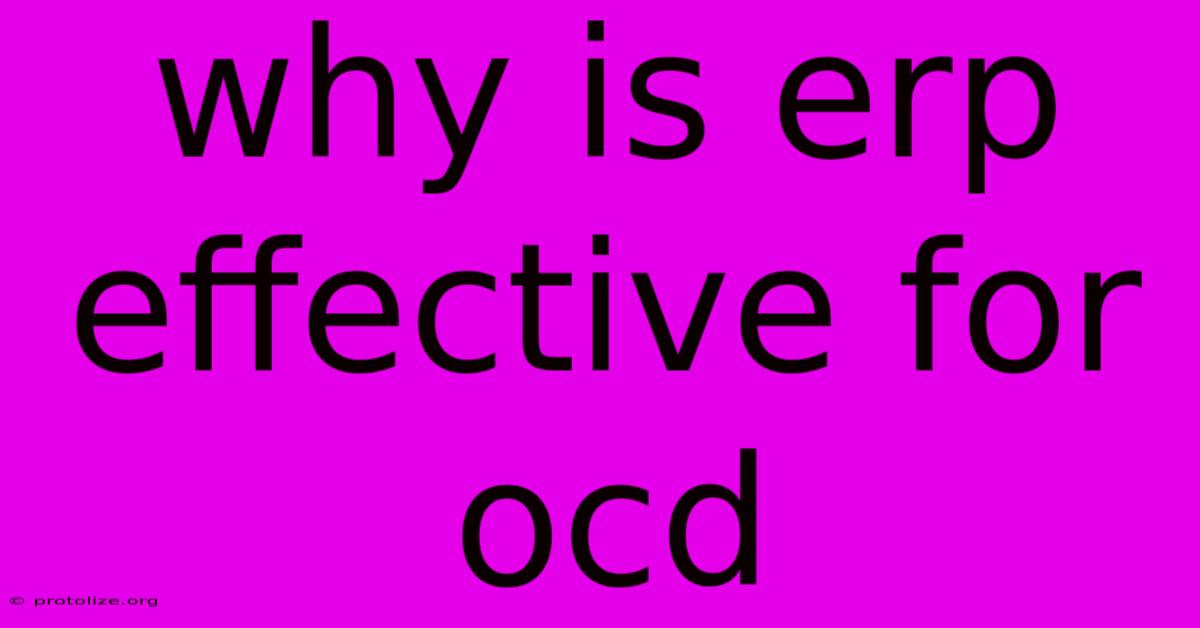Why Is Erp Effective For Ocd

Discover more detailed and exciting information on our website. Click the link below to start your adventure: Visit Best Website mr.cleine.com. Don't miss out!
Table of Contents
Why is ERP Effective for OCD?
Obsessive-Compulsive Disorder (OCD) can significantly impact a person's life, leading to distress and impairment. Fortunately, evidence-based treatments exist, and Exposure and Response Prevention (ERP) stands out as a highly effective therapy. But why is ERP so effective for OCD? Let's delve into the science behind its success.
Understanding OCD and the OCD Cycle
OCD is characterized by intrusive, unwanted thoughts (obsessions) and repetitive behaviors or mental acts (compulsions) performed to reduce anxiety caused by those obsessions. This creates a vicious cycle:
- Obsession: An unwanted thought, image, or urge arises.
- Anxiety: The obsession triggers intense anxiety and distress.
- Compulsion: The individual engages in a compulsion (e.g., washing, checking, counting) to temporarily relieve the anxiety.
- Temporary Relief: The anxiety diminishes, reinforcing the compulsion.
- Cycle Repeats: The temporary relief is short-lived, and the obsession returns, perpetuating the cycle.
How ERP Breaks the Cycle
ERP therapy directly targets this cycle by helping individuals confront their obsessions without engaging in compulsions. It's a form of cognitive-behavioral therapy (CBT) that focuses on two core components:
1. Exposure: Facing Your Fears
This involves gradually exposing yourself to situations or thoughts that trigger your obsessions. This exposure can be:
- In vivo: Real-life exposure to feared situations (e.g., touching public doorknobs if you have contamination obsessions).
- Imaginal: Imagining feared situations or thoughts.
The goal isn't to eliminate obsessions entirely; it's to reduce their power and control over your life. The key is gradual and systematic exposure, carefully tailored to your specific fears and anxieties. Starting with less intense exposures and gradually increasing the intensity helps to build tolerance and reduce avoidance behaviors.
2. Response Prevention: Resisting the Urge to Compulse
This is the crucial part where you actively resist the urge to perform compulsions. By preventing the compulsive behavior, you break the learned association between the obsession and the temporary anxiety relief. This allows you to experience the anxiety without the "escape" provided by the compulsion. Over time, the anxiety naturally decreases, demonstrating that the feared consequences of not performing the compulsion do not materialize.
Why ERP is Effective: The Neuroscience
The effectiveness of ERP isn't just anecdotal; neuroscience supports its mechanisms:
- Habituation: Repeated exposure to feared stimuli leads to a decrease in the anxiety response over time. Your brain learns that the feared consequence isn't actually happening.
- Extinction Learning: The conditioned response (anxiety) is gradually weakened by repeatedly pairing the obsession (conditioned stimulus) with the absence of the compulsion (unconditioned stimulus).
- Neurobiological Changes: Studies suggest ERP can lead to changes in brain activity, particularly in areas associated with fear and anxiety processing.
Finding the Right ERP Therapist
It's crucial to find a qualified and experienced therapist specializing in OCD and ERP. A good therapist will:
- Develop a personalized treatment plan: This plan will be tailored to your specific obsessions and compulsions.
- Provide support and guidance: The process can be challenging, and a therapist's support is essential.
- Monitor your progress: Regular check-ins will help to ensure the treatment is effective and make adjustments as needed.
Beyond ERP: A Holistic Approach
While ERP is highly effective, it's often beneficial to combine it with other treatments, such as medication. A comprehensive approach that addresses both the psychological and biological aspects of OCD can lead to the best outcomes. Remember, recovery is a journey, not a destination, and patience and perseverance are key.
Keywords: ERP, Exposure and Response Prevention, OCD, Obsessive-Compulsive Disorder, anxiety, therapy, treatment, habituation, extinction learning, neuroscience, cognitive-behavioral therapy, CBT, mental health
This article aims to provide comprehensive information about the effectiveness of ERP for OCD. Remember to consult a mental health professional for personalized advice and treatment.

Thank you for visiting our website wich cover about Why Is Erp Effective For Ocd. We hope the information provided has been useful to you. Feel free to contact us if you have any questions or need further assistance. See you next time and dont miss to bookmark.
Featured Posts
-
Erp Ocd
Dec 13, 2024
-
Wi Fi As A Service Market 31 52 Billion Projection
Dec 13, 2024
-
Erp Software Evaluation Criteria
Dec 13, 2024
-
Fans Miss Details In Last Christmas Video
Dec 13, 2024
-
Warriors Vs Rockets Odds And Predictions
Dec 13, 2024
